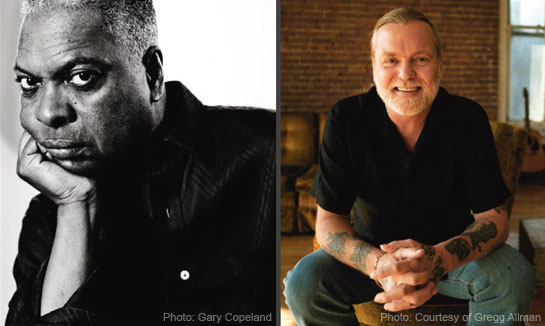
BOOKER T. JONES
While still in high school, he became leader of the house band at Stax Records, Booker T. & the MG’s, his best-known gig. Keeping up his precocious pace, Booker T. & the MG’s recorded their most enduring classic, 1962’s “Green Onions,” when Booker T. was just 18. While releasing successful recordings of their own, as the backing group for legends like Wilson Pickett, Sam & Dave and Otis Redding, they created the Stax sound. In the midst of the Stax heyday, Booker T. continued his musical education, studying applied music at Indiana University, while making history with the MG’s back in Memphis on the weekends.
In 1970, Booker T. left Stax, moving to California as an arranger and producer with A&M Records, working with the likes of Bill Withers and Willie Nelson, while sustaining his own career. In addition to releasing several solo albums, Booker T. played with everyone from John Fogerty to John Lee Hooker. In 1992, Booker T. & the MG’s were inducted into the Rock and Roll Hall of Fame. On Booker T.’s new album, Potato Hole, released in April, he’s joined by Neil Young on guitar and backed by the Drive-By Truckers. As Booker jokes, “I like to say, they let me drive. I was able to step into a different genre [“straight rock”] that I had always loved but I didn’t really play with the MG’s. It was just a wonderful experience.” New fans and old will no doubt delight in the experience as well. And as always, no lyrics are needed to reinforce Booker T.’s funky grooves.
GREGG ALLMAN
Born December 8, 1947 in Nashville, Gregg Allman picked up the guitar early in life. When his brother Duane began to play as well, taking to the instrument like a fish to water, Gregg found his own niche as a keyboardist and lead singer. The brothers formed a string of bands, including the Allman Joys and the Hour Glass, before striking gold in 1969 as the Allman Brothers Band, which jumpstarted the southern rock genre and pioneered rock ‘n’ roll as an avenue for musical improvisation. While Duane and Dickey Betts churned out 40-minute jams of guitar virtuosity, Gregg fronted the group on vocals and Hammond B3. He also penned the enduring hits “Whipping Post” and “Midnight Rider.”
After three classic albums, including the legendary At Fillmore East, Duane was killed in a 1971 motorcycle accident, but the Allman Brothers Band lived on. Brothers and Sisters was released in 1973, and Gregg Allman also released a solo album, Laid Back, the same year, experimenting with a more soulful, gospel-tinged sound. By 1976, however, substance abuse problems plagued all of the Allman Brothers, and when Gregg testified against a band employee on drug-related charges, the group split. Gregg’s second solo outing, the pop-soul fusion Playin’ Up a Storm, was released the following year. The Allman Brothers reunited in 1978, but were on hiatus again by ’82.
In 1986, Gregg released I’m No Angel, the title track of which became his signature tune. He followed this release with Just Before the Bullets Fly in 1988, and in ’89 the Allman Brothers Band reformed with new members Warren Haynes and Allen Woody. With the smoothest chemistry since the original lineup, the band enjoyed a renaissance that produced three strong studio albums, including 1991’s Shades of Two Worlds, and a renewed commitment to touring. In 1997, Gregg put out his most recent solo release, Searchin’ for Simplicity. ABB’s most recent studio album was 2003’s Hittin’ the Note, but they continue to tour regularly, including an annual three-week residency at New York City’s Beacon Theatre.
Life is good for Gregg Allman—he feels 28 and can’t wait to play. His one complaint: “That that is NOT my Facebook that’s on there. I might start one of my own, only it’ll be Gregory Allman, my real name. I’ll be glad to answer anybody’s questions.”
![]()
Elmore: What are you listening to right now?
Booker T. Jones: I’m getting ready to listen to something by Gustav Mahler, actually. I’ve been listening to everything from Sibelius to Miles Davis, Sketches of Spain with Gil Evans and his orchestrations. Some jazz, there was a lot of jazz in my beginning.
Gregg Allman: Right now my pod has the box set of Bobby Bland on it. “Further On Up the Road,” that’s not a Clapton song. Boy, you can really tell where Stevie Ray got his stuff.
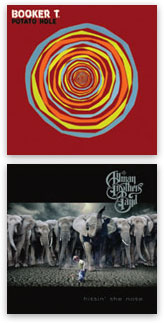 EM: What was the first record you ever bought?
EM: What was the first record you ever bought?
BTJ: Kitty Wells, and then Roy Hamilton.
GA: It was on the Cadence label; it was burgundy and silver. “Bird Dog” by the Everly Brothers.
EM: Where do you buy your music?
BTJ: I subscribe to Rhapsody, pretty much get everything from there now.
GA: A place here called Record Graveyard. You walk through a tunnel of books, stacked from the floor to up above your head. I live at this place.
EM: What was the first instrument you played?
BTJ: Drums, little dime-store, cardboard drums—if you want to call that an instrument—but then a ukulele, then a baritone ukulele, then a clarinet.
GA: Foolin’ around with? Probably the piano, but the first instrument I tried to make sense of was the guitar.
I was nine years old, and we had moved to Daytona, but I went back to visit my grandmother in Nashville. This mentally challenged boy lived across the street, Jimmy Bain, he had a 1949 Packard limousine and he was outside painting it with a can of black house paint and a big ol’ wide paintbrush—I mean the tires, everything but the windows. I said, “What’s that up on the porch?” “That’s my gee-tar.” He played “She’ll Be Coming Round the Mountain,” and I thought, “Man, what have we here?” I thought if this poor dude can play this, I can too. I was at that age when I was just dyin’ to find something to turn me on. Boy, I picked a good one, because later on in life, it kept me from losing my mind.
EM: What brought you to the instrument you now play?
BTJ: I tried to learn a lot of instruments when I was younger. I was really curious, still am curious; it’s just an interesting area of study. My mom and my grandmother played gospel and classical music on keyboard. My grandmother had a piano in her house and when I was able to reach the keys I was touching them with two fingers reaching up. I was actually a guitar player and a saxophone player in high school and I got a job at Stax Records playing baritone sax on an album, and then I was really taking someone’s place. I couldn’t really get the job, and as I left I told them I could play piano/keyboards and that’s how I kind of became a keyboard player.
GA: My brother called me on March 26, 1969, and he said, “I’m gonna send you a ticket,” and I said “I know you don’t got the money, I’ll just hang out my thumb.” As I was hanging up, I heard him say “Wait a minute! I need you to play a B3 Hammond!” I said, “What?”
EM: Who would you like to write with that you haven’t?
BTJ: Someone like Jimmy Webb, he’s just such an incredible lyricist. Bob Dylan is a past friend that I probably could collaborate with ’cause he stays in the current vernacular. He puts a finger on what’s happening in history right at that moment so he would be a great person to write with.
GA: Dave Matthews. Nicest cat in the world. He invited me up with his band—what a band! We played “Melissa” and it was probably better than the record.
EM: What musician influenced you most?
BTJ: Probably Ray Charles ’cause just before I got into my teens he made instrumental albums and played the Hammond M3 organ. Even though I didn’t have an organ, I wanted to duplicate that sound for some reason.
GA: So many of them. They touch you even when you don’t even know it. Everybody from Roy Orbison to Jackie Wilson, to Otis…Playing on the Santa Monica pier one night, I put my foot on the first step, and some guy runs up and said, “Man—Otis Redding died!” I just froze. I can tell you the print of the damned rug, I could draw it.
EM: What was the song or event that made you realize you wanted to be in music?
BTJ: I never consciously made a decision to be a professional musician, but I think it was when I was 18, the first time I heard “Green Onions” being played on the radio. It was just such a thrill. I might have made an unconscious decision then that if I could do anything, that’s what I wanted. It still makes my heart jump.
GA: I had applied to be a dental surgeon. When I got there to Butch’s house in Arlington, I was the Doubting Thomas. I got there last, and they were all set up. Two drummers, and I thought, “Train wreck!” They said, “What have you got for us?” I didn’t know what my brother told them, maybe that Leiber and Stoller was on the way. I got about eight songs out, and they were yawning. I hit them with “Dreams,” and by God they learned it, and it’s just the way you hear it today, exactly the same. We went into a jam that lasted the complete afternoon, and when we stopped, there was silence. We looked around and started to laugh like hell, and laughed the rest of the night. But I felt like I BELONGED, I had found my family. There was no train wreck; there was nothing to be afraid of. In the next three days I wrote about eight songs.

EM: Who would you like in your rock ‘n’ roll heaven band?
BTJ: I just about had my dream band on this last album. I love Neil Young; I really love Eric Clapton a lot; Ginger Baker is one of my favorite rock drummers and also one of my favorite jazz drummers. He’s incredible. Nathan East on bass. That band I just named, they actually played together, at Royal Albert Hall. The most innovative, fearless and most passionate vocalist I’ve heard recently is Lauryn Hill. Of course keyboards would be me. Getting down to one name makes me realize what I consider creatively important. I guess I really like people who experiment, who are not afraid to push the limits.
GA: Ry Cooder on acoustic and electric slide; Paul Butterfield on harp; on bass, Jaco Pastorius; on drums, Bernard Purdie—no, Steve Jordan. I don’t know that ’bone player’s name, but he plays with the Jukes [La Bamba], Stevie Winwood on Hammond, Leon Russell playing piano. I’m going to stand up and sing. I’d have Buddy Miles before he found drugs, also on drums—he can help me sing, too. I hate to put that pre-drug thing in, but when he was with the Electric Flag he was just killer, with Bloomfield. Warren Haynes on rhythm guitar, just for giggles. He’d play straight, and Ry’d play slide.
Lowell George was a dear friend. He laid his head in my lap crying like a baby. (Gregg whines) “My band won’t do what I tell them to do. They want to play this far-out jazz bullshit, and I just want to play some get-down butt-bumping rock ‘n’ roll, and they won’t listen to what I say.” I said, “Join the fuckin’ club!”
EM: What’s your desert island CD?
BTJ: Sounds of Blackness. That’s the album produced by Jimmy Jam and Terry Lewis. And I would want to hear them sing “I Believe.” I would want to hear songs with faith, in that Minneapolis funk way they do gospel.
GA: B.B. King Live at the Regal. It’s got every kind, every feel of music, back when he really, really played the show. It went from good-time to cry-in-your-beer blues. I would hope on a desert island, though, I’d get a few more than that.


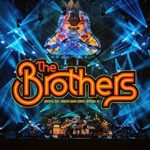
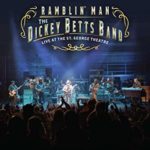

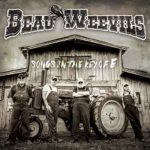

[…] the moment, my selection includes Booker T. & the MG’s’ classic Hip Hug-Her and Thelonious Monk’s Brilliant Corners. And in these sad days since the […]